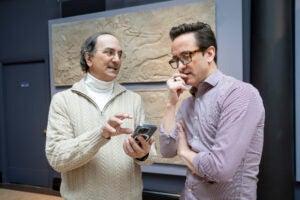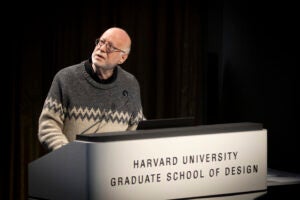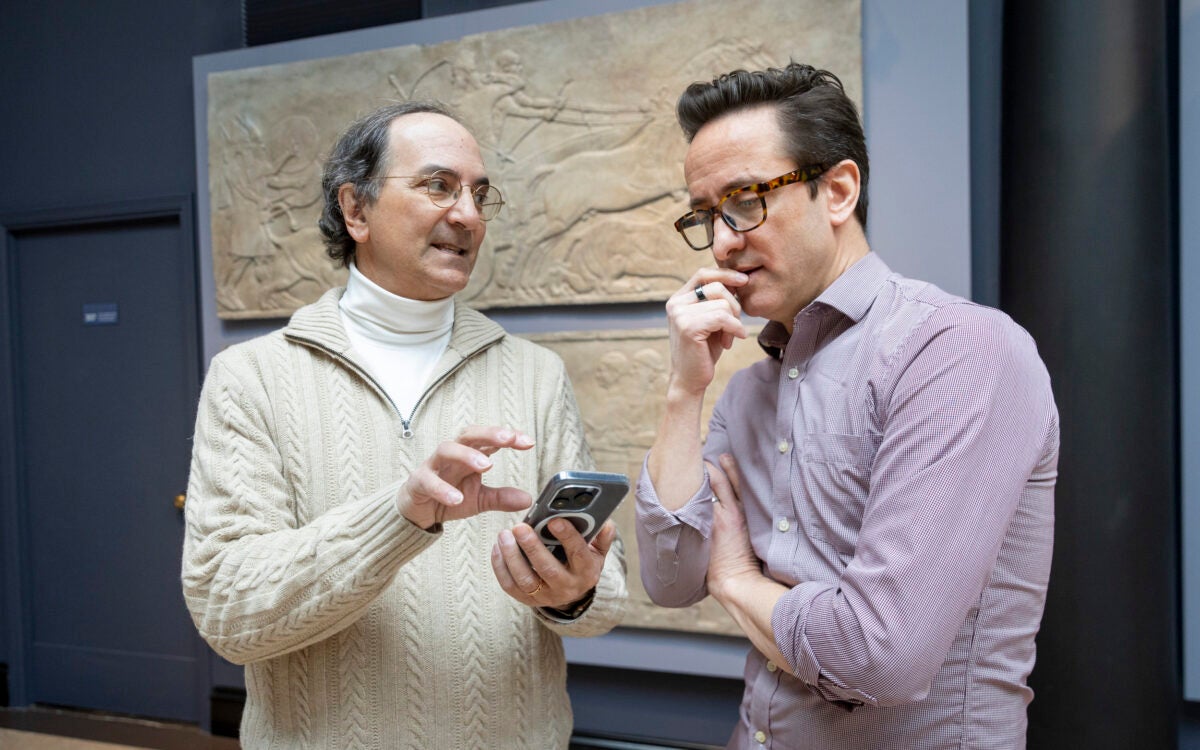Ghostly Shakespearean fragment comes to life on stage
Allen Ginsberg used “deep gossip” to describe the way artists talk among themselves. He memorialized the phrase in his elegiac poem on poet Frank O’Hara.
The same words nicely describe the deep talk that takes place all the time among the culturally engaged — conversations that for reasons of space and time and privilege most of us are never privy to.
The Humanities Center at Harvard is doing what it can to change that, by opening to the public the deep gossip of the culturally and intellectually gifted in a series of public conversations.
The latest took place Monday evening (May 5) at Zero Arrow Theatre, where an audience of 120 listened in on a discussion of “Cardenio,” a play premiering Saturday (May 10) at the American Repertory Theatre (A.R.T.).
On hand with their cumulative humor, depth, and brilliance were three theater experts, two Harvard literary scholars, and one famous American playwright.
One of the scholars — Stephen Greenblatt, Harvard’s Cogan University Professor of the Humanities — co-wrote “Cardenio” with the playwright, Charles L. Mee.
Greenblatt, author most recently of “Will in the World: How Shakespeare Became Shakespeare” (Norton, 2004), is a celebrated scholar of Shakespeare and Renaissance literature. Mee, a historian and playwright whose “bobrauschenbergamerica” opened A.R.T.’s 2006-07 season, is known for his collage-like quick cuts of action and imagery — and for giving classical Greek dramatic forms a feverish modern spin.
Their “Cardenio” is a fanciful comic expansion of a lost Shakespeare play — a late-life collaboration with dramatist John Fletcher that has survived only in literary echoes. (One of these is Lewis Theobald’s 1727 adaptation, purportedly from an original Shakspeare manuscript. “Double Falsehood, or the Distressed Lovers” bears an apt name, since controversy still rules discussions of the missing play.)
The Greenblatt/Mee “Cardenio” is set in modern-day Italy, and contains fragmentary echoes from when the two wrote and ruminated about Shakespeare in a rented farmhouse in Umbria. (The play’s realistic stage set is a villa in the verdant, hilly region — “geography porn,” remarked A.R.T. Acting Artistic Director Gideon Lester, crediting a friend — that is both attractive and illusory.)
“Cardenio” is a play within a play, set on the eve of a wedding. In true Shakespearian fashion, everything goes comically awry in a flurry of disguises, misadventures, and miscues. It blends old theatrical conventions with a modern cast of lovers, friends, and relatives whose confused neuroses are ageless.
Writing it together, said Greenblatt, was a way to work directly with a great living playwright — the sort of interlude of freshness a scholar might need. After all, he lamented, “I spent my life studying dead playwrights.”
Adding spice was the elusive historical play itself, based on a minor tale within “Don Quixote.” To Shakespeare scholars, said Greenblatt, “The History of Cardenio,” lost since the 18th century, is “the Holy Grail of missing things.”
For Mee, the collaboration was an opportunity to work with a man he called “a soul mate” — as well as the world’s best scholar of the world’s best dramatist. The decision to work with Greenblatt, he said, and get a private tutorial on Shakespeare, “took, I think, about 14 and a half seconds.”
Still, to those in conversation on stage, including Mee and Greenblatt, a collaboration of this kind seemed improbable. After all, humanists study art, but often have an uneasy relationship with those who make art.
The occasion for the public conversation might be improbable too, for the same reasons. It’s the second collaboration this year between the Humanities Center and the A.R.T. — two Harvard entities that have resolved to open a fruitful dialogue.
“They’re both meeting places” where artists and scholars can find a common language, “but [they are] also meeting places for the community at large,” said Lester, who introduced the event.
“We love collaborating with the A.R.T.,” said conversation moderator and center director Homi K. Bhabha, Harvard’s Anne F. Rothenberg Professor of the Humanities. “In both our institutions we admire and encourage scholarship … [and] the performance of ideas in a larger, more social context.”
“Cardenio,” he said in opening remarks of scholarly praise, “is a comedy involving prenuptial neurosis, irrational demands, maternal machinations, and star-crossed lovers — who eventually realize they prefer it that way.”
Yale School of Drama Professor Elinor Fuchs, one of the assembled conversationalists, called “Cardenio” — based on one reading and a dress rehearsal — “a charming soufflé of a play.”
Most amusing of all, said the dramatist and critic, “The play is about the theater itself” — a celebration of the sensibilities and strategies of being actors on a stage.
“‘Cardenio,’” she predicted, “is going to have a wonderful life in the American theater.”
Mee starts with “well-built classical plays” and layers these underlying structures with collage-like elements, said Columbia University theater scholar Martin Puchner, a visiting professor at Harvard this year.
“The wonderful thing about ‘Cardenio’ is: There is no underlying structure,” he said — and what depth it has comes only from its theatricality.
“It’s full of song and dance and virtuosity and light,” agreed Lester. “There’s a kind of irrepressible theatricality in the play,” in counterpoint to a straightforward narrative.
“Cardenio” has the mark of genius, he said, and imparts a rare whimsical and comedic tone to an American stage that these days is dominated by realism and family drama.
Lester first read the play three years ago, but because of rights issues could only produce it this year (in association with The Public Theater of New York).
But “Cardenio” is more than new (and old) and wonderful, he said. It’s a signpost of the improbable collaboration that wove its way through this week’s public conversation.
“For a great Shakespeare scholar to cross the tracks and enter the rehearsal room as a participant is … a moment of great significance,” said Lester. “Too often the worlds of theater and literature are segregated from each other. This is an important moment for us to say: We can really learn to speak a common language.”
‘Cardenio,’ the world premiere of a play written by Stephen Greenblatt and Charles L. Mee and directed by Les Waters, is on stage May 10 through June 8 at the American Repertory Theatre’s Loeb Stage, 64 Brattle St. Call (617) 547-8300 or visit http://www.amrep.org for more information.




